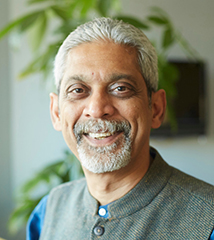
Vikram Patel, M.B.,B.S., Ph.D.
Vikram Patel is Paul Farmer Professor and Chair of Global Health and Social Medicine in the Blavatnik Institute's Department of Global Health and Social Medicine at Harvard Medical School. He co-leads the Department’s Mental Health for All lab and co-leads the GlobalMentalHealth@Harvard initiative. His work has focused on the burden of mental health problems across the life course, their association with social disadvantage, and the use of community resources for their prevention and treatment. He is a co-founder of the Movement for Global Mental Health, the Centre for Global Mental Health (at the London School of Hygiene & Tropical Medicine), the Mental Health Innovations Network, and Sangath, an Indian NGO which won the WHO Public Health Champion of India prize and the MacArthur Foundation’s International Prize. He is a Fellow of the UK's Academy of Medical Sciences and member of the US National Academy of Medicine. He served on the Committee which drafted India’s first National Mental Health Policy and the WHO High Level Independent Commission for Non-Communicable Diseases. He co-led the Lancet Commission on Global Mental Health & Sustainable Development and the Lancet-World Psychiatric Association Commission on Depression; he serves as co-chair of the Lancet Citizens Commission on Reimagining India’s Health System. He has been awarded the Chalmers Medal (Royal Society of Tropical Medicine and Hygiene); the Sarnat Prize (National Academy of Medicine); the Pardes Humanitarian Prize (the Brain and Behaviour Research Foundation); the Klerman Senior Investigator Prize (the Depression and Bipolar Disorder Alliance); an Honorary OBE (UK Government); and the John Dirk Canada Gairdner Award in Global Health. He has been awarded Honorary Doctorates from Georgetown University, York University, Stellenbosch University and the University of Amsterdam. He was listed in TIME Magazine’s 100 most influential persons of the year in 2015.
Affiliations
- Professor in the Department of Global Health and Population at Harvard T.H. Chan School of Public Health
- Co-founder and Member of Managing Committee, Sangath, Goa, India
- Honorary Professor, London School of Hygiene & Tropical Medicine, UK
Dr. Patel's research has focused on the nature of mental health problems, their social determinants, and the use of community resources for their prevention and treatment. His work spans the life course and includes child development and adolescent mental health, in addition to mental health problems in adulthood. His work played a central role in the emergence and development of the field of global mental health and that has galvanized policy, civil society and donor action to address the large unmet need for care for people with mental health problems, both in low and middle-income countries and low resourced contexts of high-income countries. He is a co-founder of Sangath, a pioneering Indian NGO which won the MacArthur Foundation’s International Prize for Creative and Effective Institutions (2008) and the WHO Public Health Champion of India Prize (2016). An additional area of expertise is universal health coverage with a focus on India.
Behav Res Ther
View full abstract on Pubmed
Arch Womens Ment Health
View full abstract on Pubmed
Lancet
View full abstract on Pubmed
J Rural Health
View full abstract on Pubmed
Lancet
View full abstract on Pubmed
Lancet
View full abstract on Pubmed
Aging Ment Health
View full abstract on Pubmed